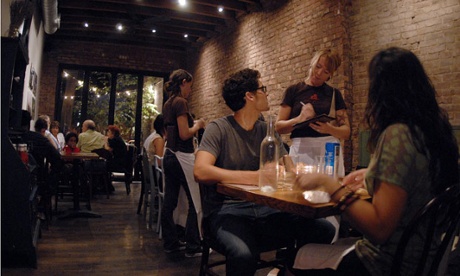
New York film director Spike Lee has angrily complained at a public debate about his father Bill, an octogenarian jazz musician, being the subject of a string of complaints from a recently-arrived next door resident in his long-time Brooklyn neighbourhood. Late night rehearsing has been Bill's habit for decades, but, he says, the newcomer is the first to complain.
My first reaction on hearing this was surprise. Have you heard Bill's soundtrack for Spike's She's Gotta Have It? I'd be complaining if I couldn't hear him through the walls. But the reason the noise dispute is attracting fresh attention - it's been public knowledge since last May - is that the younger Lee has placed it so firmly within the frame of Brooklyn's gentrification.
"When you move into a neighbourhood, have some respect for the history, for the culture," he insisted. "If you have to be a millionaire to live in New York City," he later told CNN, "then New York City is not [any longer] going to be the great city that it is."
Sounds familiar, doesn't it? Similar feelings are running high all over London too. In my bit of the capital, Clapton E5, amazed street corner conversations about the sudden glut of laptop coffee shops and shabby chic restaurants occur daily among we old-timers. For the moment it's quite exciting, adding new dimensions of vitality and variety. Yet house prices and private rents are sky-rocketing still higher because of it. That's OK if you already own and want to ship out - you could sell up and buy half of Sunderland. But round the corner from me newly-built terraced houses, not all that large, have just gone on the market for £745,000. A nearby one-bedroom flat will set you back £330,000. Future buyers seem unlikely to be the young, artsy pioneers of the recent past. Will they actually live here? If they do, will they move the place so far upmarket that it goes downhill?
Lee's respect-for-history line resonates with a story I heard on a visit to Bermondsey. Affluent new arrivals had been complaining about early morning noise from a bakery that's been there for donkey's years. Property prices have been soaring in those parts too, limiting still further the options for overcrowded social housing tenants - many of them adults still living with their parents - for moving out while staying local. One of the more media-ready London housing narratives of late concerns the middle-classes being priced out by speculators from overseas. It's certainly part of the bigger story but property price inflation has been a factor in routine outward migration for decades and, in the austerity age, its effects are also inhibiting the supply of homes people on low incomes can afford.
The problem with the debate about gentrification is that, as emotive subjects will, it too easily becomes crudely polarised. Those rightly concerned about its negative effects on Londoners who aren't well off can sometimes sound sentimental, insular, even bigoted and lacking appreciation of cities' historic, inherent changeability. Those who applaud it and engage in it uncritically are blind to the downsides for those who profit from it least.
Taste, aspiration and enterprise are all part of the picture here, and these are factors with lives of their own. The huge role of housing, planning policy and the property market, though, could and should be better managed by politicians to help ensure that gentrification helps neighbourhoods more than it hurts them. Respectful regeneration strategies and more genuinely affordable homes might not sort out every noise disturbance row, but would certainly help to protect some of the best things about our city.

